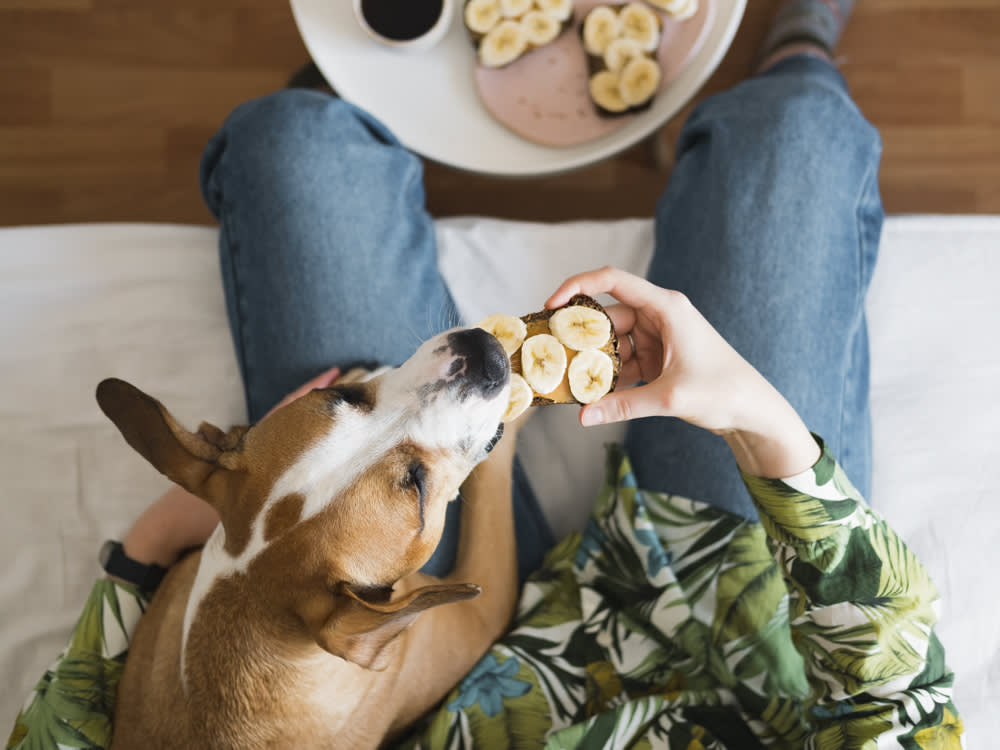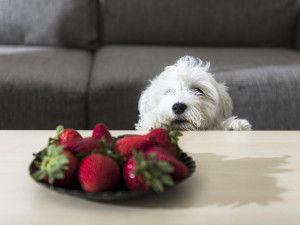Can My Dog Eat Bananas?
Yep – bananas are a healthy and delicious treat for your pup

share article
Good news: your favourite on-the-go breakfast is perfectly safe for your dog to eat. In fact, many dogs love bananas – and that’s a good thing since they’re high in potassium, fibre and magnesium. That said, bananas are also high in sugar, which means you should give them to your pup in moderation. Below, learn more about the health benefits of bananas for dogs, plus how to add them to your pup’s diet.
The health benefits of bananas for dogs
Bananas are known to be one of the most nutritious fruits for dogs. They make a great low-calorie treat since one banana contains just 105 calories. Bananas are also high in potassium (great for muscle and blood vessel function as well as for regulating the acidity of body fluids), fibre (a handy home remedy for the occasional bout of diarrhoeaopens in a new tab or constipationopens in a new tab) and magnesium (important for energy transport and protein building in the body).
In addition to being high in fibre and potassium, bananas contain loads of vitamin B6 and vitamin C. Vitamin B6 helps metabolise proteins in the body and regulates blood cells that bring oxygen to the brain and muscles. Vitamin C is an antioxidant that helps reduce cell damage and build cartilage. Experts suggestopens in a new tab that it’s better to get these nutrients through fruits and vegetables rather than supplements.
How to add bananas to your dog’s diet
Bananas are high in sugar, so moderation is key (and they might not be good for diabetic or overweightopens in a new tab dogs). When giving your dog bananas, introduce them slowly and in small quantities, since gorging on this tasty fruit can give your dog a stomach ache. And you might find that your dog doesn’t like bananas. It happens. To feed your pup bananas, simply peel them and mash them. You can also add sliced banana as a topper to your dog’s food, or cut it up into pieces as treats.
The bottom line: can dogs eat human food?
There are many safe human foods that dogs can enjoy. Like any new food, it’s best to chat to your vet about any concerns before trying them, especially if your dog has a sensitive stomach.
Any human food given is added as a treat, not as part of their balanced diet so it should not be served as their main meal. If you are wary of giving your dog human food, it’s best to leave it. Your dog should be receiving all nutrients from a complete and balanced dog food and you can offer them some tasty dog treats as a bonus.
What are some other fruits that are safe for dogs?
Pears:opens in a new tab if fed in moderation, it is safe for dogs to eat small pieces of pear without the core or seeds. Pears are high in vitamin C and K as well as fibre so can be a juicy treat for your dog.
Blueberriesopens in a new tab: mostly blueberries are good for dogs. They’re low in calories and contain antioxidants and vitamins C and K but due to the high fibre content, it’s best to feed in moderation as things could get messy!
Watermelon:opens in a new tab watermelon is made up of mostly water and can be a refreshing treat for your dog. However, it’s essential to remove the seeds as they could cause severe blockages.
Fruits that are not safe for dogs
Grapesopens in a new tab: grapes can cause acute kidney failure in dogs. The toxic ingredient, tartaric acid, is present in variable amounts in every grape. Even if your dog eats one grape, you should check in with the vet to make sure everything is okay.
Cherries: avoid giving your dog cherries as the pit and stems can cause intestinal blockage. The pit is also extremely toxic to dogs.
Avocadoopens in a new tab: while small amounts of avocado flesh are generally considered safe for dogs, larger quantities are riskier due to the presence of persin. Just to be safe, it’s best not to give your dog the green fruit.

Daniela Lopez
Daniela Lopez is a digital media specialist and long-time contributor to The Bark.
Related articles
- opens in a new tab
Can Dogs Eat Chocolate?
Keep those chocolate bunnies far away from your pup this Easter (and always)
![Beagle puppy dog holding a peeled carrot in its front paws sitting in the grass]() opens in a new tab
opens in a new tabCan Dogs Eat Carrots?
Yes, this crunchy, sweet vegetable is a great addition to your dog’s diet
- opens in a new tab
Can Dogs Eat Onions?
Add them to the list of no-nos in the kitchen...
![A woman smiling at her dog while carrying a bowl of food.]() opens in a new tab
opens in a new tabIs Yoghurt Good For Your Dog?
It’s safe and healthy, and most dogs love it
- opens in a new tab
Can Dogs Eat Strawberries?
In moderation, strawberries are a tasty, healthy treat for your pup
![Chinese crested dog with a pear in their mouth]() opens in a new tab
opens in a new tabCan My Dog Eat Pears?
Yes – pears and your dog can pair together. However, there are a few things to watch out for






